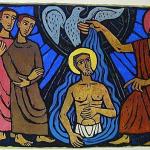I’m delighted to report that a publisher has accepted my proposal for a book with the working title, What Jesus Learned From Women. And so I’m returning to blogging about the topic, with a view to making quick progress on the manuscript, garnering feedback, and hopefully generating interest. Not all posts related to the topic will do all of the above. But I will definitely do all of them, and will include at least some glimpses not just of the broad topic but the specific things I’m hoping to include in the book – without, of course, giving it all away so that you have no incentive to actually buy the book!
In some ways, Mary ought to be the obvious place to start in an exploration of what, when, and how Jesus learned from women. And sometimes there have been wonderful imaginative portrayals of this – such as the movie Mary, Mother of Jesus in which made Mary the author of the parables, stories she told Jesus as a child which he then reused to good effect later in his life. In it the comment is made to her by Joseph when he is dying, “Everything he is, you made him.” See my blog post about the film for more details.
Mary is a natural place to begin because a mother’s influence on a child precedes that of any other human being. And unless one wants to deny the humanity of Jesus (something that many in fact do in practice if not in theory), that Jesus learned from his mother can be safely assumed without any need for controversy. Of course, that doesn’t mean that there won’t be controversy. But when there is controversy even though there shouldn’t be, that highlights an area that deserves attention in many theological systems.
And so for these reasons, Mary is perhaps not only a natural but also a necessary place to begin in a book on this particular topic. For those who have difficulty accepting that Jesus learned, the role of a first-century Mediterranean Jewish mother brings the central issue into sharp focus. Apocryphal accounts abound in which Jesus begins speaking immediately after birth, or in which he goes to school only to begin instructing his instructors. However, to embrace those accounts as history – in essence if not in their specific details – is to utterly deny the humanity of Jesus. Before we wrestle with the question of what Jesus may have learned from men and/or women when he was older, therefore, we really do need to begin with the woman who may safely be presumed to have heard Jesus speak his first word, and who was chiefly responsible for helping him to get there.
This brings up one of the major methodological questions about silences in historical sources, one that I’ve discussed before. If we do not have information, should we fill in the silence with what was typical, presuming that something unmentioned was deemed unnecessary to mention because it was nothing out of the ordinary? I discussed this previously in connection with the question of whether Jesus was married, but don’t worry, the book that I am working on will not have a chapter with the title, “What Jesus Learned From His Late Wife” (although you can tell I thought about it). It also highlights the question of whether we can learn about a figure’s teaching by looking closely at those who learned from them. Can close attention to Jesus and his siblings tell us about Mary as mother and educator of her children? (And similarly, can Jesus provide insight into the teaching of John the Baptist, a question I am wrestling with in another book project.)
There was quite a bit of blogging about Mary at Christmas time. But the question of whether we can determine anything about the historical Mary, and what she taught Jesus, should not be relegated to the seasons of Advent or Christmas.
A book that depicts Mary as not a virgin was banned by Franciscan University of Steubenville.
Erin Wathen and D. L. Mayfield talked about the revolutionary character of the Magnificat.
Scot McKnight, John Bergsma, Bob Cornwall, and Richard Beck also had interesting things to say.
The Zondervan blog had a post about women in the Gospel of Luke, including but not limited to Mary.
See also:
https://www.episcopalcafe.com/magnify/
Spotlighting Student Work #11: Mary–Tradition and Controversy













